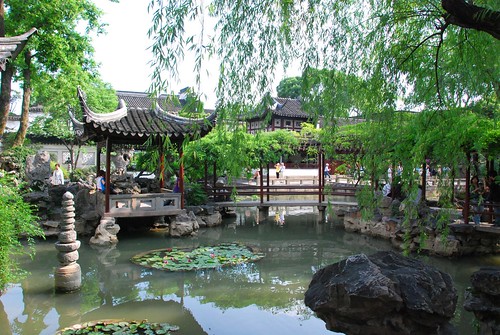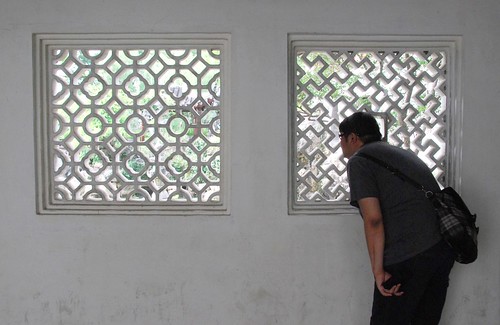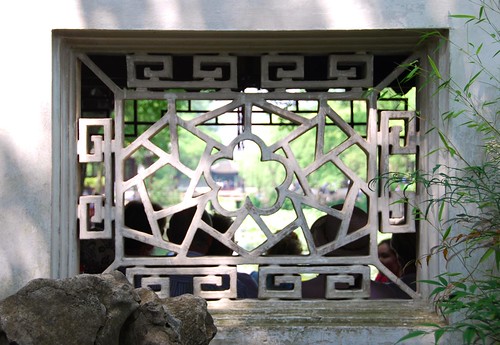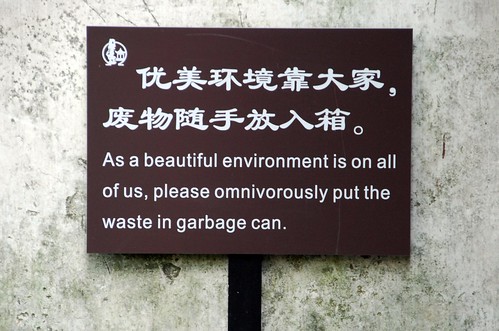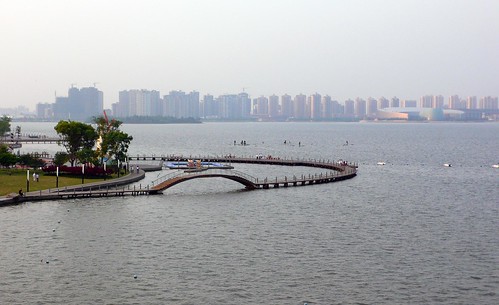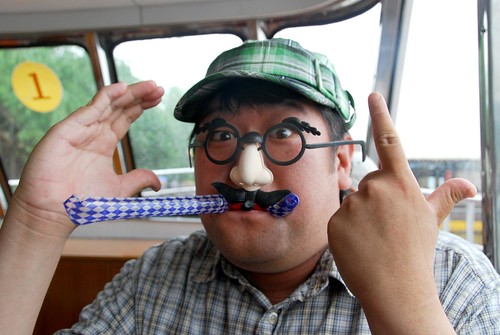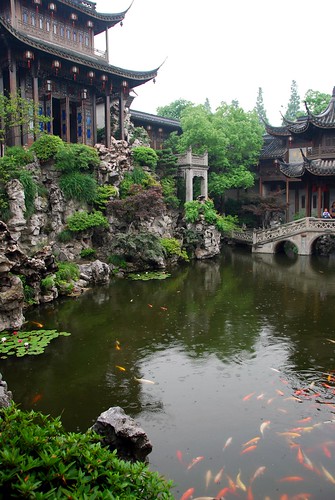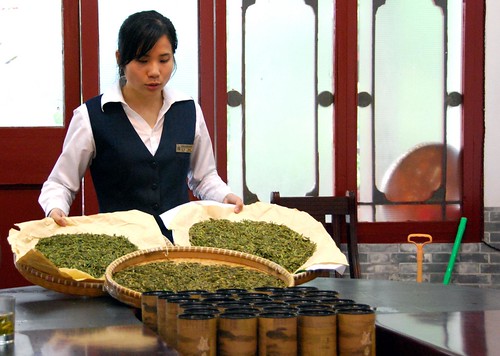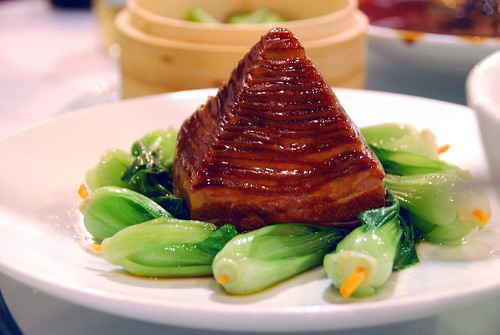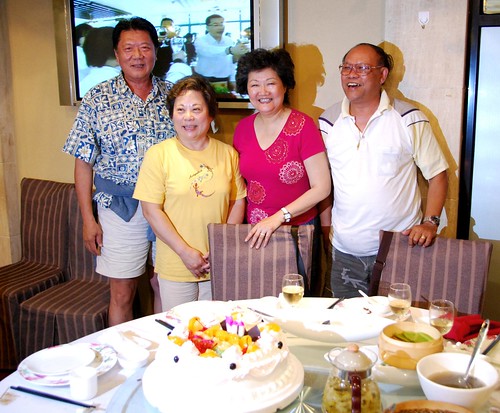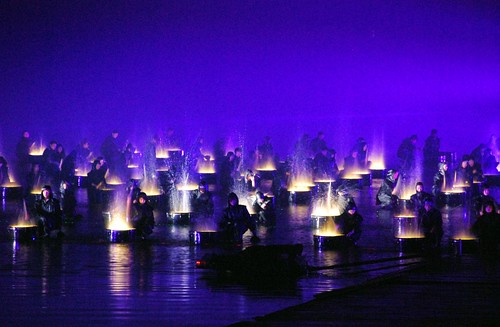Search results for "beijing"
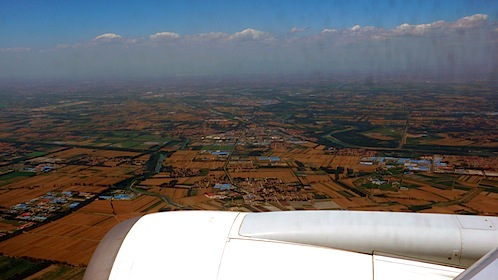
View as we fly into Beijing from Tokyo. Apologies for the dirty window!
Hiya! Just a quick note to let y’alls know that we’ve updated our route map! Our original plan was to fly to Jordan after China, but we just discovered that it’s going to be “capital H” Hot there right now. So we’ve added London as a destination, mostly because we have friends there (and we’ve had such an amazing time visiting places where we know peeps!), but also to kill sometime while this planet cools down a bit (at least in the northern hemisphere).
Note that for all future destinations on our map, we’ve only added our flight points…for instance, when we’re in London, we will actually be visiting Ireland and…some other mystery country (possibly Sweden because we have family there, but we are open to other suggestions if you’ve got ‘em!), even though our map only shows that we will be in London for 3 weeks. Also, we show Madrid as a destination, but we won’t be staying there long (if at all). Due to restrictions with our around-the-world tickets, we are just using Madrid as a jumping-off point to go to northern Africa (Morocco, possibly Tunisia). Our plans have been rather fluid as of late, and it feels right to make decisions as we go, so we just don’t want to jump the gun and say we are going to be somewhere and then disappoint you later. ![]()
As a general guideline, here is our future travel schedule:
- July 16 to August 10: London, Ireland, mystery country (possibly Sweden or Denmark)
- August 10 to September 7: Turkey
- September 7 to September 16: Jordan
- September 16 to October 2: Egypt
- October 2 to October 16: Morocco or Tunisia (via Madrid)
- October 16 to October 30: Peru
- October 30 to November 29: Argentina
- November 29 to December 12: Chile
- December 13, 2009: Home to San Francisco!
Also, we’ve added all our stops in Asia to the map so you can see all the places we’ve been so far! Enjoy!
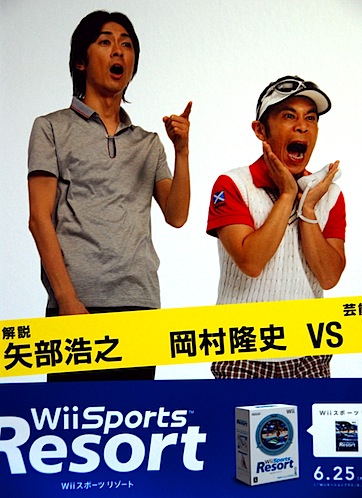
This photo has absolutely nothing to do with any of this, it’s just a really funny ad we saw in Japan. Totally made my day…hopefully it will bring a smile to your face too!
Here is a collection of both general travel and country-specific websites we’ve used to book hotels, figure out logistics, or just gather information.
GENERAL TRAVEL
Lonely Planet
Lonely Planet guidebooks are indispensible in Southeast Asia, but we’ve found them somewhat lacking in the Middle East (i.e. Turkey and Egypt). Their Thorntree Forum can be very helpful when you’re off the beaten path and you need some information that the books are lacking.
Wikitravel
Lonely Planet has great info, but their books are only updated once every two years, which means it is often out of date by the time it’s in your hands (especially in places like SE Asia, where prices can change from week to week). Also, many hotels and restaurants can suffer from what we call “Lonely Planet Syndrome,” meaning they jack up their rates or the quality decreases once they’re mentioned in the backpacker’s bible. Wikitravel usually has more current info and can be a great source for hostel and hotel recommendations.
TripAdvisor
Great resource for hotel information in developed countries, esp. Europe. To find information on hostels, click on the “Specialty Lodging” tab at the top of a specific city’s hotels page.
Couchsurfing.org
We haven’t used this service yet, but we’ve met other travelers who have had great experiences with it, especially in larger cities. We cant wait to use it and report back!
US State Department Country-Specific Travel Requirements
If you’ve got a US passport, click on this page to find out visa and entry requirements for any country in the world.
BootsNAll
A good place to start if you are researching an around-the-world trip.
OneWorld
This is the airline alliance we went with for our around-the-world tickets. For a great rundown of all the different alliance options, check out the round the world flights wiki page.
AirAsia
A budget airline that flies the all the major cities in Asia and Australia.
ARGENTINA
Saltshaker.net
A Buenos Aires-centric food blog. DROOL.
AUSTRALIA
Jetstar
The “Southwest Airlines” (i.e., budget airline) of Australia. Note: if you are flying into Melbourne, don’t make the same mistake we did and fly into Avalon. It’s out in the boonies.
Wotif.com
For last minute hotel deals. Technically, they cover hotels around the world, but it’s really most developed in Australia.
SydneyLinks
We found our apartment in Sydney via this website. The apartment was in a great location (Potts Point), the price was reasonable (about US$125 per night over the NYE holiday, when apartment rental prices can go through the roof), and the staff was very professional.
The Nunnery
A little steep for a private room, but otherwise a GREAT little backpacker spot in an excellent location in Melbourne.
Deep Sea Divers Den
This is the liveaboard we did in Cairns to dive the Great Barrier Reef. Read about our experience here.
Cairns Unlimited
We rented a camera from Cairns Unlimited for 3 days, and it cost about 75AUD, approx. US$58 (which is a good deal considering rental on the boat is about 25AUD per dive or something like that?). They were great! Not only did they deliver the camera to our hostel, but they picked it up after we got off the boat, and delivered a DVD with all our images the next day. Now that’s what we call professional! Check out the photos from our dive trip here.
BOLIVIA
Travel-Bolivia.com
An excellent resource on the major sites in Bolivia, plus transport and accommodation info.
CHINA
ctrip.com
A great online resource (in English!) for hotel bookings and flight arrangements. We typically pay the same amount for a hotel using this website as we would if we stayed in hostels. We’ve also found great flight deals on this website—we flew from Wuhan to Shanghai for 200RMB each (about US$30)…cheaper than taking the train! And best of all, they came to the rescue when a hotel in Beijing was trying to upsell us to a pricier room, saying that the budget room we booked was not available. A great resource in a country that’s not exactly known for it’s service skills.
ChinaTravelGuide.com Train Schedule
An online database of China’s train schedules. Just type in two cities, and all routes between point A and point B will be listed! Super handy!
JAPAN
JAPANiCAN
A great website for online hotel bookings at discounted rates. We wanted to extend our stay at a hotel in Kyoto, and when we asked at the front desk, the price was 2000 yen (about US$20) more expensive than the online price! So we booked the extra night online and spent our extra yen on a bowl of ramen.
Japan Rail
You simply *must* buy this rail pass if you are thinking traveling around Japan on a budget. A 7-day pass is almost the same price as a round-trip ticket from Tokyo to Kyoto, so if you have any other destinations in mind, it’s worth it!
JORDAN
Jordan Jubilee
Incredible online resource on Jordan, by a Western woman who now lives part of the year in Wadi Musa. So good we didn’t need any other guide (ex. Lonely Planet) for the country.
NEW ZEALAND
Kiwimaps
We picked up this road atlas in New Zealand, available at any supermarket or drug store. It was awesome! Campsites, gas stations, and activities are clearly marked on the map with icons, so you know if the town you’re approaching has a holiday park, a surf break, or a glacier. We didn’t have a Lonely Planet or other guide in New Zealand…just this trusty map and some recommendations from a friend we met on the plane. ![]()
SOUTHEAST ASIA
Travelfish
Excellent and current guide to transport and accommodation in a region where guesthouses can go out of business from one week to the next and border crossings can close in a heartbeat. Definitely a must for anyone thinking about backpacking through this region.
TAIWAN
Forumosa
Everything you could ever want to know about Taiwan—from where to find used clothing to the best hiking trails. And it’s in English!
Taipei Day Trips I & II by Richard Saunders
A wonderful guide to hiking and walking trails all within day-trip distance of Taiwan’s capital. We did at least 5 of the trips outlined in Taipei Day Trips I while we were in Taipei.
TURKEY
Turkey Travel Planner by Tom Brosnahan
Great info about Turkey. We found the bus company section and the info on travel during Ramazan particularly helpful.
Our looooong day in Hangzhou was followed by a much more leisurely morning exploring a floating village called Wu Zhen. The tour group arranged a boat trip through the village for us, which was quite picturesque and relaxing. As we floated down the canal, we saw many old homes that are still inhabited by families (as evidenced by their underwear and other laundry hanging out to dry—Chinese people are definitely not afraid of other people seeing their underthings).
As it turns out, this picturesque little village has a sad story. Wu Zhen was turned into a tourist attraction by the Chinese government, and even though visitors must pay an entrance fee, the residents do not receive any payment for the inconvenience of having hundreds of tourists filtering through their hometown on a daily basis. In fact, the people of Wu Zhen are not even allowed to vend until 4PM (when all the tour buses leave). I felt really bad for the village residents, because it was clear that their hometown had been turned into a zoo, and you could see in their faces that they were annoyed and frustrated by the constant stream of visitors coming to gawk at their “old” ways of living. As a result, I didn’t take too many photos here; I didn’t want to disturb these poor people anymore than we already were. Our tour guide explained that most of the young people had already moved out of the village; only the elderly (i.e., the people who could not afford to buy new homes) were still around. China’s incredible economic rise has brought a huge amount of prosperity to a huge amount of people, but the people of Wu Zhen have definitely been left out of that…unable to cash in on tourism even as their homes get turned into a modern-day Chinese Disneyland. China, as we are finding out, is many things, but it is almost never solely what you see on the surface.
We left for the town of Suzhou after our Wu Zhen tour, but before I get to that, I wanted to mention something else about our Hangzhou experience. This was Jeremy and I’s first time on a Chinese tour, and that in itself is an experience. Independent travel is not a big thing for Chinese—they prefer to travel in big groups, and they like the ease of a tour group; they don’t want to think about where to go next, or how to get there. You can see a Chinese tour group coming a mile away—they all (willingly) wear matching hats. Seriously, our tour guide told us that if he was taking a Chinese group around and they didn’t give them hats, everyone would change to a different tour service, saying “this crappy tour doesn’t even give you a free hat!”
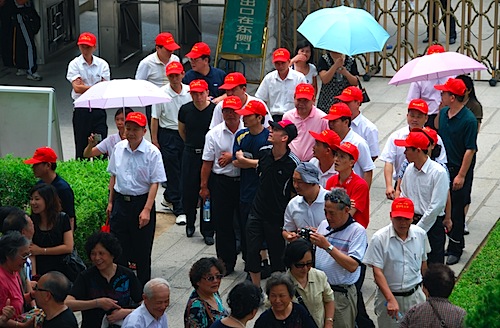
Not only can you SEE a tour group coming from a mile away, but you can HEAR them too. The matching hats are usually following a tour guide who carries a flag (usually yellow) and is screaming into a megaphone. You could be in the most serene, peaceful, natural setting, but the tour guide will be blabbering away on his/her megaphone. It’s almost like the Chinese feel they won’t get their money’s worth unless the tour guide is talking the entire time.
Our Chinese tour guides made some slight changes to accommodate our “American” group: we didn’t get hats, for example. But they still talk an awful lot (sometimes they even sing for you)—they even talk when we are sitting on the bus, in transit from sight to sight. Luckily, most of what our Hangzhou tour guide had to say was quite interesting…we found out, for example, that men in Hangzhou area of China do all the housework, in addition to earning all the household’s money. This is very unusual in China, as the country is an extremely patriarchal society. On top of that, in order to attract a bride, the man must own a home, which can cost at least 1 million RMB in Hangzhou (about US$150,000). This is not a small amount of money in China, and usually the parents help their sons buy their first house so that they have a chance attracting a desirable wife. As a result, Hangzhou is the one area in China where having a daughter is more desirable than having a son. I am not really sure what women in Hangzhou do, since they don’t work and their husbands do all the cooking, cleaning, grocery shopping, and laundry. I guess they just shop all day? As you might imagine, Hangzhou men are extremely desirable husbands in China. ![]()
OK, switching gears now to Suzhou, the garden city. Unlike the gardens in Beijing, which were built for emperors, Suzhou’s gardens were built for private citizens, so they are smaller and more intimate. We toured The Garden to Linger In the first day:
and a much larger garden (I can’t remember the name of it) the following day:

View of Leifeng Pagoda in the background. This is a feature of Suzhou gardens: incorporating background elements into the garden’s design.
My two favorite things about Suzhou’s gardens were (1) the amazing windows…each one has a different pattern, and there are hundreds of them!
And (2) Suzhou’s amazing Chinglish signs!
BTW, here’s a link to an amazing Chinglish brochure from our hotel…not to be missed!
That evening, we celebrated our final meal in China with Eddo, who was returning to Shanghai, while we went on to Wuyi Mountain. It was a lovely dinner, at a table that had to contain the world’s largest lazy susan:
The restaurant overlooked a large lake, and we got to see the huge amount of redevelopment that has gone on in Suzhou. Apparently Suzhou is following in Shanghai’s footsteps and building a large number of high rises as the Chinese economy booms.
Frank told us that he felt Suzhou has lost its charm…and it’s hard to disagree. I mean, the gardens are still there (many of them are UNESCO World Heritage sights, so they are protected), but it’s hard to imagine how that ancient way of life is going to coexist with a population that has an ever-growing appetite for the new and shiny. And if the old way of life does persist, will it just be an act? A show put on for tourists who want to come and visit “ancient” China?
Once again, if you just look a little bit deeper, you can see all the issues that China has to grapple with as they move full-steam towards modernity. China is a fascinating place at a fascinating time in its history, and it’s easy to see that the journey ahead for this huge country will involve some difficult choices…many of which are being put off for the short-term pleasure of economic prosperity.
Next stop on the Meng(hermann) Tour of China…Hangzhou, a large city most famous for its large lake, Xihu (West Lake). We met up with the Frank and the rest of the tour group here, who had already been traveling together for a few days. We got off to a great start—our first meal together was at a restaurant where every dish featured an ingredient used in Chinese medicine, which made for a delicious, healthy, and interesting meal.
We started off the following day with a cruise on West Lake. This is one of China’s most heavily touristed sites, but we had more fun taking pictures of each other in Groucho Marx glasses that I bought for 5RMB each (about US$0.50). Not only were they hilarious, but a hidden blowhole made two streamers pop out either side of your mouth like a mustache.
We all took photos with the glasses, except for Jeremy…seems that the specs are for flat little Asian faces only; the fake nose wouldn’t fit over Jeremy’s Western nose. ![]()
If you want to see the ONE photo I uploaded of East West Lake, look here.
Next we toured an old Chinese house, built by a rich, famous Hangzhou merchant. It was quite opulent, with blue glass windows (unusual in China) and an enormous garden with a koi pond. This estate was very different from the houses we saw in Hongcun and Xidi. Similar to today, it seems that the closer you are to the ocean in China, the richer you can be (though with all the money the Chinese government is currently pouring into the inland cities of Chengdu and Chongqing, this is changing).
As I mentioned previously, on these organized tours, your days are jam-packed with activities. By noon, we had already accomplished what Jeremy and I would consider a full day of sight-seeing activities. But we had much more in store. Next up was a visit to a local, government-owned teahouse. Hangzhou is famous for its Dragonwell green tea, and we were all ushered into a tasting room to learn about the different health-inducing properties of this tea. The woman conducting the tasting was an AMAZING salesperson…she explained the difference between spring, summer, and autumn-harvested tea (spring is best; summer and autumn-harvest leaves are the crappy ones used in teabags), and even let us see and smell the difference for ourselves (spring tea is actually lighter in color than summer and autumn tea).
She explained the difference between A, AA, and AAA grade leaves (they are all spring-harvest leaves, but AA leaves are the small leaves picked from the top of the bush, and AAA leaves are picked from bushes that grow in the wild). AA leaves are about twice as much per kilo as A leaves, and AAA leaves are 4 times as much…but according to the saleslady, you need twice as many A leaves as AA leaves to make a single glass of tea, so the increase in price is moot (a convenient sales tactic).
We learned a lot about tea at this tasting, but it was far more interesting was watching this saleslady do her thing. I have never seen a salesperson with powers as fierce as hers…she knew EXACTLY what to say to convince everyone of the powers of this Dragonwell tea. The pinnacle of her pitch was a demo where she coated some grains of rice with iodine and then tried to wash the iodine off with water (of course, the sludgy brown stuff would not budge). Then, she poured a glass of Dragonwell tea into the cup with the sludgy grains, and the rice turned completely white again (the implication being that this is what the tea will do inside your body—remove the toxins and scrub your insides as clean as a grain of shiny white rice). We learned that with Dragonwell, we should use cold water to make the tea; hot water kills all the polyphenols. She flowed imperceptibly between the demo and the selling portions of the afternoon, and by the time she was ready to sell, everyone was eagerly whipping out their wallets.
The force was strong in her, but she was no match for Chou Mama, the eldest lady on our tour. Chou Mama had about 60 years of bargaining skills on the saleslady, and she used her considerable skills to slowly but surely bargain the sale price down lower and lower. It was like the Clash of the Titans, and we had front row seats!
After we all left with kilos of tea, we took a boat tour of a swampland area, which was quite beautiful and relaxing:
And then toured the beautiful Leifeng Pagoda near West Lake:
But wait, there’s more…we also had an amazing dinner that featured a BACON pyramid, and we celebrated four different May birthdays: my Mom and Dad’s and two other people on the tour with us (Mark and Dolores).
And finally, we ended the looong day by seeing the Impressions West Lake show, directed by Zhang Yimou (the famous Chinese film director who also created the Beijing Opening Ceremonies). The show was the performed ON West Lake (actually on the water), and it retold the tale of a ancient Chinese love story.
The show was visually stunning, but if you are not familiar with the Chinese myth, it can be hard to follow the story, as it is told in a very abstract way. Also, I guess because Jeremy and I had been blown away by the Olympics Opening Ceremony, we thought that the West Lake show would be a lot tighter. Still, it was an excellent experience and you can’t beat seeing a show that is performed ON a body of water.
SCHWOO! It was a long but fulfilling day, and we went to bed happy to have gotten a lot out of Hangzhou.
Note: Hey everyone, let’s give a warm welcome to Eddo! My little bro shares his thoughts as the family travels Huangshan…I love that even though this post is about a mountain, he manages to nerd out on urban planning. Kudos, Eddo! ![]()
As an urban planning nerd/activist, I’ve always been interested in the growth and history of cities. Why did this particularly scenic peninsula morph into modern-day San Francisco? How did the end of the Mississippi River support a multi-ethnic creole population like New Orleans? How did two tiny islands in the middle of the Seine River become a focal point for a global city? How did civilization in the past evolve into its current form, and how do our actions today determine tomorrow’s society?
Anyways, enough of this urban speculation—I promise I’ll get back to it later—let’s get to the heart of this entry. Huangshan (in English, “Yellow Mountain”) is located in the Anhui province of China, and is a major mountain range which has been opened up for tourism. It has inspired countless Chinese poems, literature, and paintings, and deservedly so, because it is one of the most scenic and beautiful places I’ve ever personally experienced.
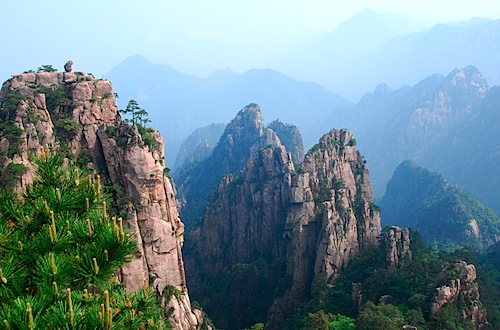
Monkey Rock (the little rock perched on top of the huge stone on the left) overlooking the Valley.
I’ve never been to China before, let alone Huangshan. The last time I was remotely close to China was probably when I was 6 or 7 years old, and was in Taiwan for my Da Jo Jo’s and Da Jo Ma’s wedding. I don’t really recall much from that time, except I liked riding on my youngest uncle’s motorcycle/scooter, and that it was really hot. So for me, Huangshan was not only an eye-opening experience, but also my introduction to China.
China’s problems with rapid modernization and urbanization are well-documented, and I don’t think I need to go into too much detail, but to be introduced to China via its rural and agricultural communities, is, in a word, refreshing. We in America like to glorify a simpler time—when seasonality and locality weren’t just buzzwords for haute cuisine, when communities and societies flourished not because of economic indicators like GDP and inflation rates, but instead on the reliance of individuals in each community to provide a good or service necessary to its citizens. And this is what China is about, I think. Despite its rapid modernization, at the core of all production is people—roads are created by people moving around rocks in wheelbarrows, crops are planted by people leading water buffalo through a field. The concept of labor here is unlike America, where machines have taken over the most difficult of tasks. If there is a resource that China has utilized more so than any other country, it is its people. Performances like the Beijing Olympics Opening Ceremony requiring massive amounts of people, control, coordination, planning, and creative vision, could not have happened anywhere else in the world. Of course, this is both a positive and negative—things are built or created at a frenetic place, but the value of human labor is less than in other countries and services rendered by humans cost exponentially less than anywhere in the West. People are valued less as specialized individuals as they are cogs in a well-oiled economic machine.
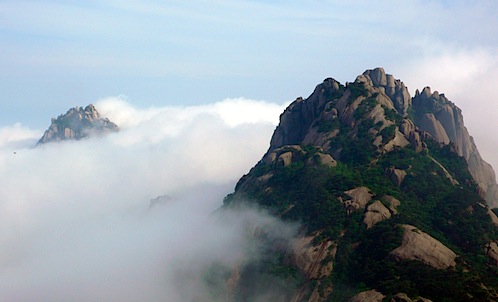
Huangshan’s famous “cloud ocean.” It literally moves in and out in minutes.
Walking through Huangshan is a series of stone steps and pathways meandering along streams, cliffs, forests, and valleys. It is stunning. But you do get a sense of devaluation of individual labor. Couriers or porters carry up all goods that are used by the hotels at the top of the mountains (Ed. note: Indeed, supplies are not allowed to be hauled up the mountain on the gondola—even though it is surely cheaper to mechanize the delivery of these goods—in order to create jobs for local farmers who otherwise wouldn’t be able to earn a decent wage), luggage from tourists, and in some cases, people who cannot walk up or down the grueling paths of the mountain. It is incredible—I can’t imagine the amount energy or labor involved. They get paid by the kilo, and generally balance inhuman amount of goods on a single bamboo stick on their back. Our tour guide told us that they can make up to 1,000 RMB a month (around US$150) which is actually a decent salary in their area. Individuals who work in the hotels on the top of the mountain stay up there for three months at a time, and get free room/board while earning salary.
I don’t know how old the trails and steps of Huangshan are, but one does get a sense of how civilization and societies emerged in the olden days. Locations were picked based on geographic resources, and paths were then created to connect major population centers with each other. Much like cities in America developed along the Mississippi River from Chicago down to New Orleans due to geography and natural resources, I imagine this is how “cities” developed in Huangshan. Except in Huangshan, these “cities” are essentially outdoor plazas with hotels and restaurants, instead of actual cities. But these gathering places and webbed network of paths towards peaks and valleys and sights are in a sense, a microcosm of China, where cities are connected to each other by a network made up of boats, rail, roads, and planes rather than stone steps.
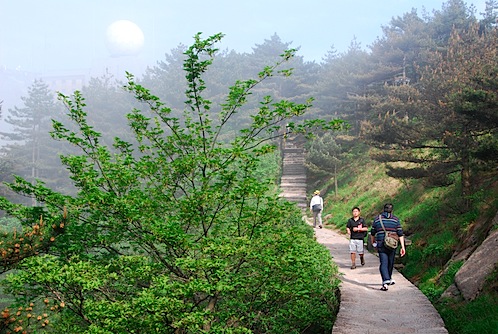
Eddo hiking towards the giant golf ball (on the left, in the background), a weather station located at Huangshan’s highest point.
Huangshan, much like the rest of China, encompasses a scale that I can barely comprehend. It is stunning. It is dramatic. It is imposing and it is spectacular. It is filled with jagged peaks, intense sunrises (which we woke at 4:30 for, climbed up a mountain and after concluding we wouldn’t see it, started hiking back down the mountain, only to see the sun peak through the trees, d’oh!), and ancient trees and wildlife. The Chinese have a saying that Huangshan is number one—after experiencing Huangshan, you need not experience any other mountains. My mother, who was also experiencing China for the very first time (she was born in Taiwan and because of China’s irregular rules on tourism during the Mao era, she hasn’t been able to visit until China became more open in the years after Mao’s death and China’s embrace of capitalism) celebrated her birthday on top of Huangshan. She said “I had always heard of Huangshan ever since I was a little girl but was never able to experience it firsthand until now. I cannot believe that I am celebrating my birthday here. I am so happy.” I think we’d all agree—there is no experience like Huangshan in the world, and despite what you may think about China politically, Huangshan is not just a Chinese treasure, but a treasure for the world.
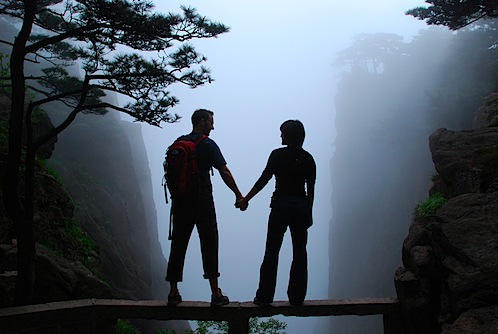
P.S. Here is a link to Eddo’s photos of Huangshan on his Facebook.
Now, before we get into all the incredible things we’ve seen in China (and we’ve got a LOT to show you), I thought a little intro to the country was in order. If any country deserves a post dedicated entirely to it’s (mis)conceptions, it’s China. I have to admit, we were a little worried about coming here…life is just so good in Taiwan—everyone is helpful and friendly, everything is clean and safe, every place is beautiful/interesting/vibrant. From the stories we heard (and from my previous experience in Beijing in 2000), we were worried that China was going to be dirty/polluted, that the people were going to be rude, and that traveling around the country was going to be just plain difficult.
Of course, the Taiwanese don’t help matters when it comes to disseminating negative opinions about the mainland. For those who are unaware of the story, Taiwan is a democratic nation that considers itself an independent entity; China believes that Taiwan is a part of China. The relationship can be quite contentious; most famously, Jinmen, a Taiwanese island 2km off the coast of Chinese Xiamen, was bombed regularly throughout the 1950s and 60s by the Chinese, but only on every odd-numbered day (the legacy of a weird wartime agreement that China had with Taiwan). As you can imagine, the future of the relationship between the two nations is vehemently debated by their populaces.
Anyway, to say that some Taiwanese think of their big neighbors to the north as heathens would not be too far from the truth. Jeremy and I heard countless stories from Taiwanese people when they found out we were headed off to China. The bathrooms are disgusting!, they said. They fertilize their fields with human poo! The locals will follow you into your bathroom stall to watch you pee (because they are so fascinated with your foreign-ness), so bring an umbrella to shield yourself from their prying eyes! And worst of all, everyone will be mean or try to cheat you.
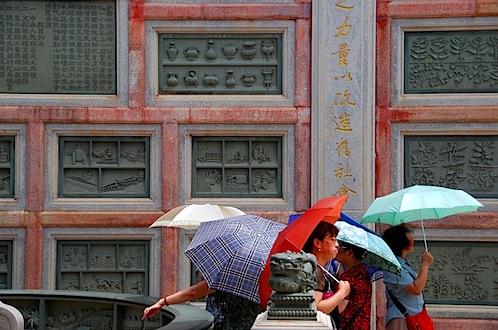
The umbrella brigade, Xiamen.
On top of all these opinions were my own impressions from my first and only visit to the mainland. I went to Beijing in 2000 as a guest of the government. This was when Beijing had just won the 2008 Olympics, and China was trying to promote the country as an international tourist destination. I came here as a bellydancer with my troupe to participate in the International Cultural Tourism Festival, along with 2000 other dancers and musicians from 60 different countries. So, I had a pretty different experience of the place than most visitors back then, but I did (1) use the most disgusting public bathroom I have ever seen (basically a large dirt room with holes dug out of the ground…no doors, of course), and (2) feel the heavy hand of the government. Since we were basically invited there to experience the “new” China and then go home and tell all our friends how awesome it was, we were escorted around all the most famous palaces and gardens in Beijing, and taken to a “farming village,” where all the residents had been given new but poorly built condos (to show how “modern” China had become). Of course, this experience did not do much to improve China’s reputation amongst the San Franciscans I was traveling with; many of them went home with a bad taste in their mouths.
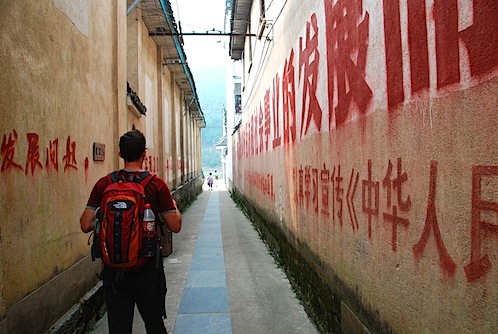
Jeremy and Communist propoganda, Anhui province.
But I stayed on an extra week after everyone else left, and was shown around town by a friend of a friend who lived in Beijing. He was a travel food writer, and was well-connected with the art scene. What I saw during that week left me so impressed with China that I dreamed for a while of moving to Beijing.
Given all that we heard in Taiwan and all that I witnessed in 2000, our expectations kept wavering back and forth between intrigue and trepidation. I imagined that returning to China after 9 years—after the country’s moment of glory during the 2008 Olympics, after the rapid industrialization that has taken place here—that much would be changed. I was not wrong. I mean, I knew it would be different, but in just 10 years, China has become a completely different country: not just the way it looks, but the attitudes of the people. They seem more hopeful somehow, more relaxed, and on the other hand, more imperious, too. I mean, just imagine for a minute that every building in San Francisco was constructed in the last 15 years. Imagine what that kind of rapid change does to a citizen, the amount of national pride they must feel, and how quickly that can turn into conceit. In fact, Frank (the guy who catered our wedding—he was our tour guide for the 2 weeks we traveled with my parents here), who brings American tour groups to China almost every month, let us in on his feelings towards the country: “The structure is all there…the hotels, restaurants, everything is first class. But the people…some of them got too rich too fast. There is a lot of arrogance here.”
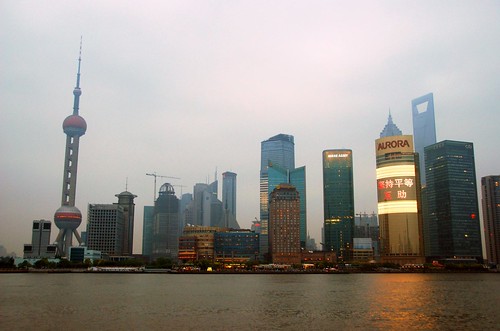
The Bund, Shanghai. The haziness you see in the background is “moisture” in the air, not “pollution.”
Indeed, China does sometimes seem like an awkward teenager whose maturity has not yet caught up with its anatomy. For instance, even in the 5-star hotels and restaurants, the service here can leave a lot to be desired. We had an awkward experience with a bellboy who lingered in our room, waiting to be tipped (even though we later found out that my parents had already tipped him on our behalf). And, most dramatically, the hotel we booked in Xiamen tried to send us to the old wing, until Frank put his foot down and demanded that we be given rooms that we had booked in the newer part of the hotel. Later on, I heard through the tour group grapevine how Frank explained that sometimes the hotels (even the 5-star hotel in Xiamen) will try to pull stuff like this, since most people will just accept it.
Then again, there does seem to be some real effort towards change (or at least the illusion of change). I wouldn’t be surprised if I found out that China had hired some Western consulting company to come in and educate the government about China’s reputation in Europe and America, and then had gone about swiftly changing all these habits/features. Disgusting bathrooms? Well, they’re still here, but they are not nearly as bad as the dirt-ditch-in-the-ground I visited in Beijing in 2000, and they certainly are not in the bigger cities anymore. Our tour guides seem particularly sensitive to the issue (clearly they have been instructed to be on high alert re: this topic), one going so far as to tell us that we should not drink water that day, since we were going into the countryside and he couldn’t guarantee the cleanliness of the bathroom. Air pollution? Well, now that smog in the air has been rebranded as “moisture” (seriously—our tour guide in Shanghai told us that we were not looking at air pollution, but rather, the sky was hazy because it was “very wet, very moisture.” Yeah, right). And of course, Beijing famously went around trying to correct all it’s “Chinglish” signs (one of the things I find most charming about China). We even heard that the Beijing populace was instructed not to wear more than 3 colors at a time (Chinese people tend to wear whatever they happen to pull out of their closets, clashing patterns be damned).
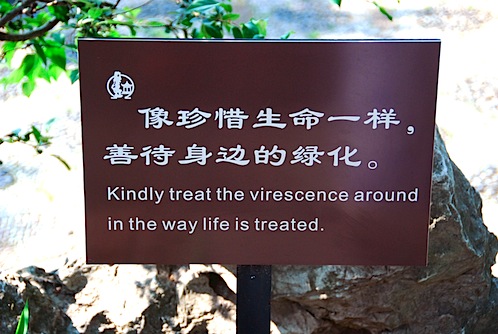
Amazing “Chinglish” in Suzhou, China.
Despite how quickly things change here, the government has not yet managed to stamp out all things distasteful to foreigners. People think nothing of picking their noses in public. Or of hacking up a huge loogey and spitting in right next to your foot. Bumping into you or cutting in line is not even considered rude—Chinese barely even blink an eye when this happens to them. The little kids with giant slits cut into their pants (so they can squat in the street and do their business) are still around, though there are fewer of them.
And the people still idolize Western culture. I can’t tell you how many strangers have come up and asked Jeremy to take a photo with them. Our tour guides keep telling me how “if Jeremy lived here, all the girls here would be calling him” (um, thanks?).
I write about these things not because I find them distasteful, but because China is (as is well documented) in the midst of serious economic and social change. The China that Jeremy and I are experiencing right now may not ever exist again, as the country rapidly reinvents itself (at least on the surface) into a first-world nation. I find this incredibly fascinating. I think it probably turns some people off to see the power of the State, but for me, traveling in China during this time is an awe-inspiring experience.
With all this rapid economic and social turnover, it’s easy to think that China has turned a corner politically as well. But, in fact, there is evidence that the country is still ruled with a heavy hand. There is still a one-child policy (but only in the cities…if you live in the country and your firstborn is a girl, you are allowed to try for another one after 5 years; if you live in the city and you go for a second, you will be fined 100,000RMB—about US$15,000—and your second child’s education will not be paid for by the state). People have had their villages turned into tourist traps with absolutely no compensation from the government (we visited a water village where they charged an entry fee, though the residents were not compensated, and were not even allowed to vend until 4PM). When there was some confusion over one of our flights and we ended up at the wrong airport, the tour bus driver anxiously sped us over to the correct airport, because if we missed our flight, he would be fined.
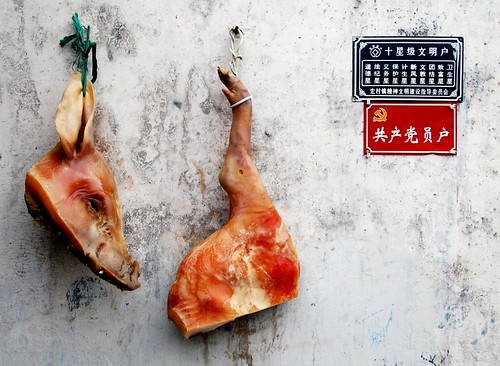
Dry-cured pig parts and a plaque that reads “a Communist lives here.” Hongcun, China.
Still, this is a far cry from the China’s authoritarian past. Many of our tour guides, when showing us around ancient villages, mentioned that much of the town and its ancient relics had been destroyed during the Cultural Revolution. I found this critique of the government interesting, until I realized that the current government was probably trying to distance itself from the destruction and oppression of the Mao era.
All of this is bittersweet to overseas Chinese like my parents. There is real pride from seeing China deliver itself intact from the isolation and poverty of the Mao era, but underneath the surface, some anger and shame lingers over what happened to The Individual during Communist rule. My mother, who was born in Taiwan only one year after her mother (my Popo) had fled China with her KMT Air Force husband, told me that she truly never thought she would be able to come to this country in her lifetime. It was amazing to be here with her and my Dad and to hear the heartbreaking stories of how first the Japanese invasion and then the Communist Revolution broke up my grandparents’ families (all four of my grandparents left home when they were between 14 and 18; only my Nai-Nai, paternal grandmother, ever reunited with her mother—50 years after she left home).
I’m not really sure if there is a clean end to this post, I suppose there really can’t be since our education of China is ongoing. I’m not even really sure if there was a point to this essay, other than to put all my thoughts down in pixels before they get lost in a flurry of activity (and perhaps, buried with a China that will not exist in 10 years). Perhaps I just wanted to document this time so that when we return to the country sometime in the future, we can look back and say, “remember when?” Suffice to say, I am fascinated with every minute of our experience here, and I feel, as descendant of this country’s history, somehow more connected to this place that I did to Australia or Laos, for example. I observe this country with a keener eye and a deeper understanding of its story. And I am learning that I love China as you would love a family member: sometimes they frustrate you, sometimes they challenge you, and sometimes you don’t agree with their actions, but in the end, you still share blood, and that is the tie that will forever bind.
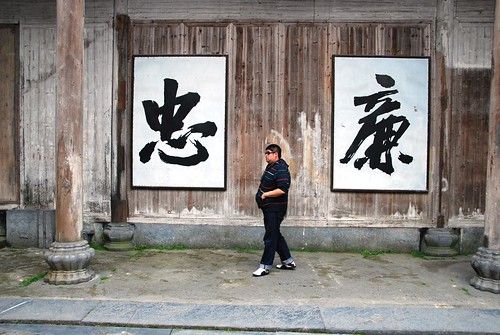
Eddo and “loyalty” (on the left). I don’t know what the word on the right says…Mom? Dad? Help?

